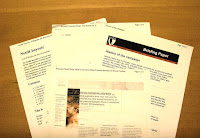When it’s a Good Idea to Use the B Word: Two Simple PR Lessons from the Nestlé Baby Milk Saga
 Preparing for a lecture about how a PR crisis can become “chronic” I have been fact checking some case studies such as the long running “Nestlé Boycott”. This case is very interesting in many ways, but today I have noted two apparently trivial details that are instructive for anyone who is creating content for websites, blogs and social media.
Preparing for a lecture about how a PR crisis can become “chronic” I have been fact checking some case studies such as the long running “Nestlé Boycott”. This case is very interesting in many ways, but today I have noted two apparently trivial details that are instructive for anyone who is creating content for websites, blogs and social media. My first step in research is often to google the topic and the search string I chose for the first attempt was “nestle boycott” – a fairly obvious choice. Scanning the results I noted that this search locates all the content produced by the boycott campaign -- www.babymilkaction.org for example -- and the helpful Wikipedia page but it does not find any response from the Nestlé company.
By searching the company website very diligently I was able to find at least one document that includes what is effectively a company response -- buried in a 1999 speech at http://www.nestle.com/MediaCenter/SpeechesAndStatements/AllSpeechesAndStatements/09_30_1999.htm -- but it does not appear in the google search results because the company does not use the expression “Nestlé boycott” anywhere. They do use the word boycott once in the speech, but this is not enough to get on the first page or Google results. This is not surprising but on reflection it seems to be a not terribly good idea. The company also has a special website defending its position -- http://www.babymilk.nestle.com/ -- but this site does not include the word “boycott” anywhere and I found it only because I was very determined to get the company’s side of the story with or without their help.
Perhaps the company prefers to avoid using this label “Nestlé Boycott” but that’s what people call it and that’s what people are going to search for. By avoiding this label they just drive everyone to the campaign pages and any other content produced by adversaries. A more sensible approach might be for the company either to mention this label in their text, but perhaps stating it in a way that distances the company from the expression. For example, they could write something along the lines of “the organized campaign that is commonly known as the ‘Nestlé Boycott’”. This method has the advantage of working even when the content is quoted. A technical alternative is to insert the term in the “meta tags” of the web page – those hidden spaces where you can add keywords that search engines can see but do not appear on the screen. I suspect that if they did embed and tag the boycott label, combined with their ownership of the nestle.com domain would ensure a high google ranking for their page, placing their response close to the pro-boycott sites.
I mentioned two lessons, and the second is another apparently minor detail that can derail the best efforts of the PR department. Just before leaving for a business trip I printed both the campaign’s excellent briefing paper “History of the Campaign” (www.babymilkaction.og/pages/history.html), the Nestlé 1999 speech page and the content of the Nestlé babymik page. Hours later, sitting on an airplane I pulled out the file to study these papers. Alas I could not read any of the Nestlé pages because the speech came out as just three blank pages with a Nestlé logo in each corner and the babymilk page was rendered unreadable by the company’s own reader questionnaire window overprinted on the text. I have mentioned this problem in this blog three years ago -- http://andrewhennigan.blogspot.com/2007/12/on-meaning-of-printable.html -- and I am still astonished how in 2010 large corporations can still have web pages that you cannot print properly. There is a lesson here for everyone in PR and communications: there is no point staying up all night drafting a perfect statement if the users cannot read it and there is no excuse for having a page that does not print correctly.

Comments
Search engines help define what your stakeholders see so you have to be aware of these issues and how to deal with them.